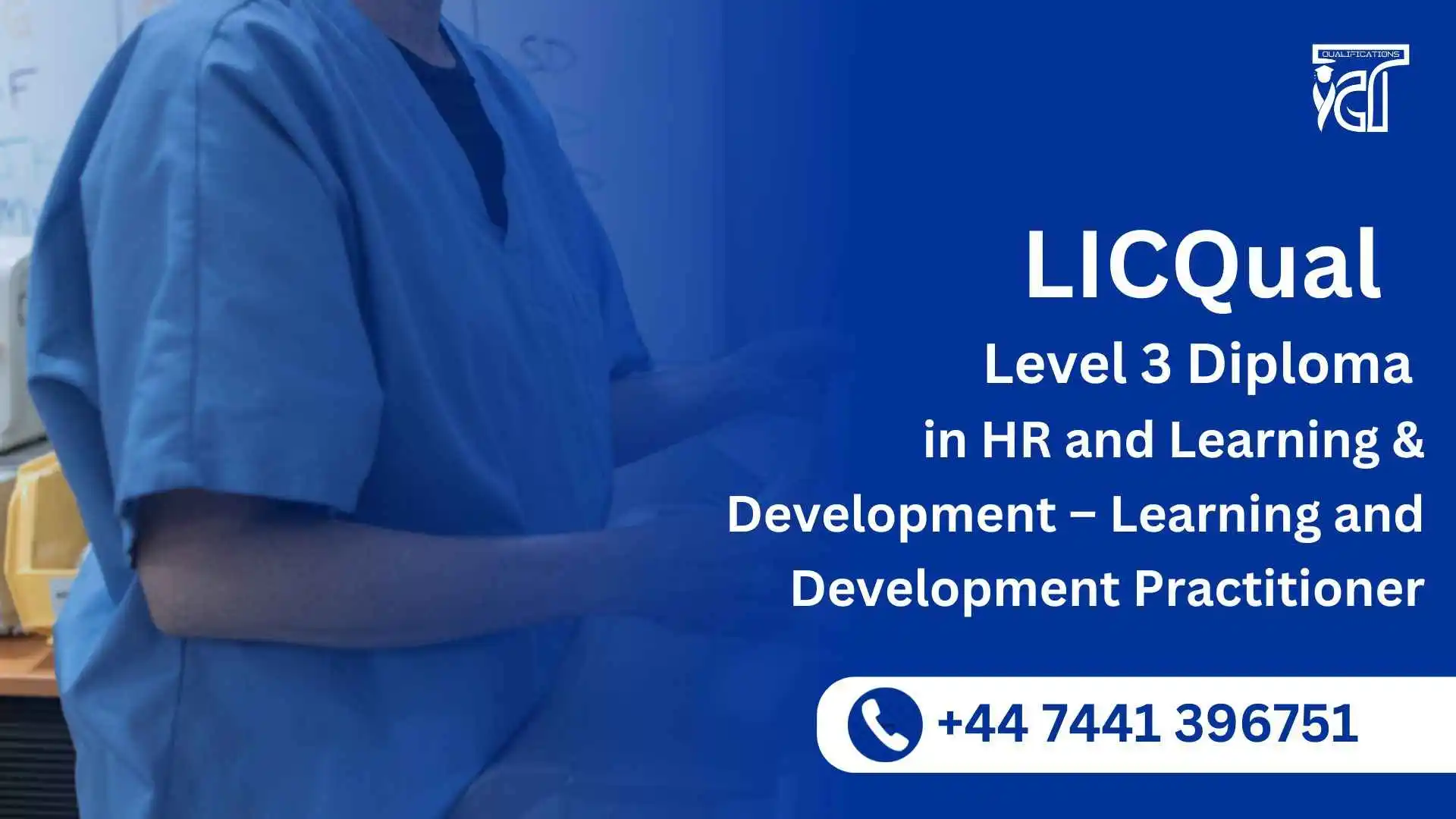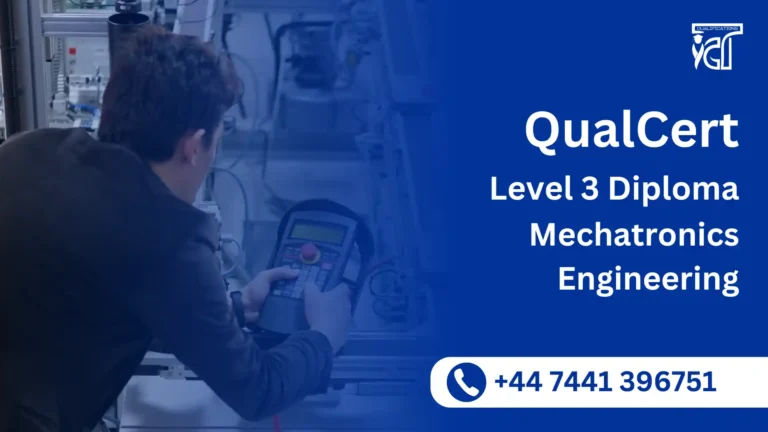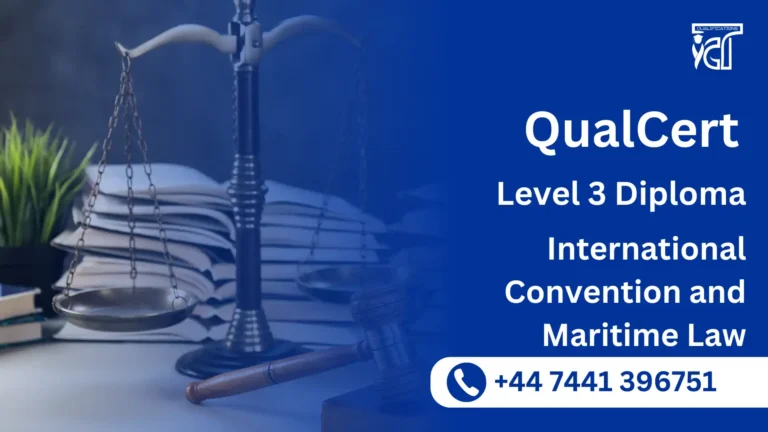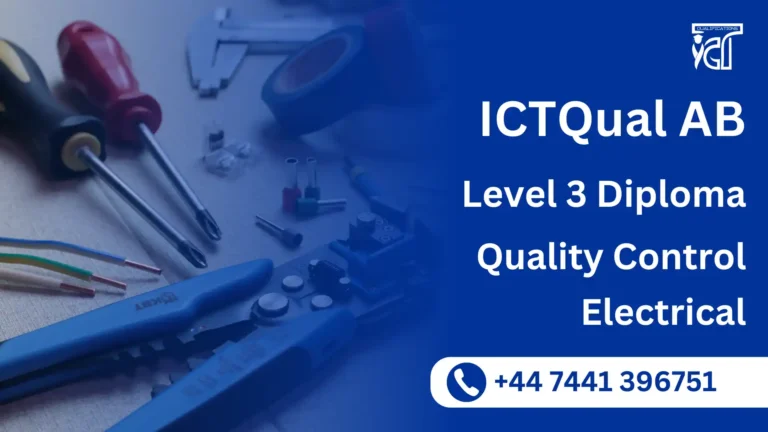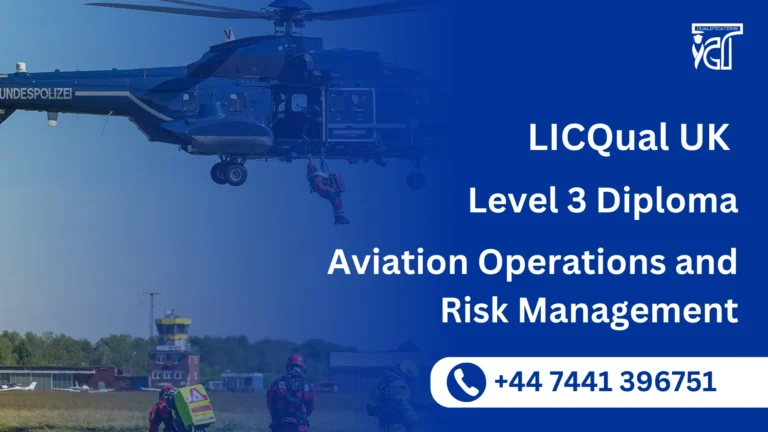The LICQual Level 3 Diploma in HR and Learning & Development – Learning and Development Practitioner is a UK-based qualification designed for individuals who want to build a strong foundation in employee learning, training delivery, and professional development. This assignment-based program provides learners with the practical skills and knowledge needed to support workplace learning initiatives and contribute to organizational performance.
Throughout the course, learners explore essential areas such as designing and delivering training, supporting talent development, evaluating learning outcomes, and applying modern learning methods in the workplace. The program also highlights the importance of aligning learning and development practices with broader HR strategies, ensuring that employee growth directly supports business objectives.
Ideal for aspiring L&D practitioners, HR support staff, or those already working in training and development roles, this diploma offers a flexible learning pathway without traditional examinations. Instead, learners complete assignments that allow them to apply their knowledge to real workplace scenarios, making the course both practical and career-relevant.
By completing the LICQual Level 3 Diploma in HR and Learning & Development – Learning and Development Practitioner, professionals demonstrate their ability to design, deliver, and support learning activities that enhance employee skills, motivation, and engagement. The qualification not only equips learners with essential competencies for immediate career growth but also provides a solid stepping stone toward advanced HR and L&D studies, opening up wider opportunities in human resource management, training, and organizational development.
LICQual Level 3 Diploma in HR and Learning & Development – Learning and Development Practitioner
The Study Units of LICQual Level 5 Diploma in Learning and Development are as :
| Unit Ref# | Unit Title | G-L-H | GLH |
| LICQ2200571-1 | Principles of Learning and Development | 10 | 40 |
| LICQ2200571-2 | Identifying Learning Needs in the Workplace | 10 | 40 |
| LICQ2200571-3 | Designing Inclusive Learning and Development Activities | 10 | 40 |
| LICQ2200571-4 | Delivering Effective Learning Sessions | 10 | 40 |
| LICQ2200571-5 | Evaluating Learning and Measuring Impact | 10 | 40 |
| LICQ2200571-6 | Using Technology and Digital Tools in Learning and Development | 10 | 40 |
GLH (Guided Learning Hours) and TQT (Total Qualification Time) are terms commonly used in vocational qualifications to help define the amount of time a learner is expected to spend on their studies.
1. GLH (Guided Learning Hours)
GLH refers to the number of hours a learner spends being directly taught, supervised, or supported during their course. This includes the time spent in activities such as:
- Classroom instruction
- Practical workshops
- One-on-one tutoring or mentoring sessions
- Online learning sessions with tutor support
In other words, GLH represents the time that learners are actively engaged with their instructors or learning activities.
2. TQT (Total Qualification Time)
TQT represents the total amount of time a learner is expected to invest in completing a qualification, including:
- GLH (Guided Learning Hours): Time spent on direct learning, as explained above.
- Self-Directed Learning: This includes time spent on independent study, research, assignment completion, preparation for exams, and any other work the learner does outside of direct teaching hours.
TQT is a broader measure that includes all the time required to achieve the qualification. It helps learners and employers understand the overall commitment required for the qualification.
Key Differences Between GLH and TQT:
- GLH focuses on direct learning with guidance or supervision.
- TQT includes GLH as well as independent study time and other learning-related activities.
Example:
If a qualification has a TQT of 600 hours and a GLH of 250 hours, it means the learner should spend 250 hours in direct learning (classroom, online, or tutor-led sessions) and 350 hours on independent study or research.
1. Principles of Learning and Development
- Understand the role and importance of learning and development in supporting organizational growth.
- Gain knowledge of key learning theories, models, and approaches to adult learning.
- Develop the ability to align L&D strategies with business objectives and workforce needs.
2. Identifying Learning Needs in the Workplace
- Learn how to assess and analyze skills gaps within teams and organizations.
- Develop techniques for conducting training needs analysis (TNA).
- Understand how to prioritize learning needs to support business performance.
3. Designing Inclusive Learning and Development Activities
- Gain skills in planning and structuring effective training programs.
- Understand how to create inclusive learning activities that address diverse employee needs.
- Learn how to ensure training design meets organizational goals and compliance requirements.
4. Delivering Effective Learning Sessions
- Build confidence in delivering engaging and interactive training sessions.
- Learn strategies for adapting training delivery to different audiences and learning styles.
- Develop presentation and facilitation skills that encourage active participation.
5. Evaluating Learning and Measuring Impact
- Understand methods for assessing the effectiveness of learning interventions.
- Learn how to measure return on investment (ROI) in training programs.
- Develop skills to use feedback and evaluation data for continuous improvement.
6. Using Technology and Digital Tools in Learning and Development
- Gain knowledge of modern digital learning platforms and e-learning tools.
- Learn how to integrate technology to enhance employee training and engagement.
- Understand how to apply blended learning approaches for flexible and scalable delivery
Enhanced Career Opportunities in Learning & Development
- Gain a UK-recognized qualification that strengthens your professional profile.
- Open doors to roles such as Learning & Development Practitioner, Training Coordinator, or HR Support Specialist.
- Build a solid foundation for progressing into advanced HR and L&D qualifications.
Practical Skills for Workplace Application
- Learn how to design, deliver, and evaluate impactful training sessions.
- Develop the ability to identify learning needs and create inclusive development activities.
- Apply modern L&D principles directly to real workplace scenarios for immediate results.
Expertise in Measuring Learning Impact
- Acquire knowledge of evaluation methods to measure training effectiveness.
- Learn how to link employee development to organizational performance.
- Gain skills in demonstrating the return on investment (ROI) of learning programs.
Confidence in Using Technology for Learning
- Enhance your ability to use digital tools and e-learning platforms.
- Understand how to implement blended learning approaches for flexible delivery.
- Develop future-ready skills for supporting digital transformation in workplace training.
Flexible, Assignment-Based Qualification
- Complete the diploma through assignments instead of exams, making it practical and career-focused.
- Study at your own pace, balancing work, personal, and study commitments.
- Apply your learning in real time, strengthening both knowledge and professional competence.
Pathway for Long-Term Professional Growth
- Position yourself as a capable L&D practitioner who drives workforce development.
- Build transferable skills valued across multiple industries and sectors.
- Gain a stepping stone to senior-level HR and learning & development roles.
Aspiring Learning & Development Practitioners
- Individuals looking to begin a career in training, employee development, or workplace learning.
- Learners aiming to build a strong foundation in L&D principles, training delivery, and learning evaluation.
- Those seeking a recognized UK qualification to enhance employability in HR and L&D roles.
Current HR or Training Professionals
- HR assistants, administrators, or coordinators who want to expand their skills in employee training and development.
- Training coordinators or facilitators aiming to formalize their experience with a professional qualification.
- Professionals seeking to improve their ability to design, deliver, and evaluate effective learning sessions.
Career Changers Seeking Entry into L&D
- Individuals from other professional backgrounds interested in moving into learning and development roles.
- Professionals looking for a practical, assignment-based course to apply their skills in real workplace contexts.
- Career changers aiming to gain confidence and credibility in a new HR or L&D path.
Employees Supporting Workplace Training Initiatives
- Staff responsible for onboarding, coaching, or mentoring new employees.
- Team leaders or supervisors who play a role in supporting staff development.
- Employees looking to gain structured knowledge of learning and development methods.
Learners Seeking Progression in HR and L&D
- Students planning to advance to higher-level HR and L&D diplomas or certifications.
- Individuals aiming to strengthen their professional profile with a UK-recognized qualification.
- Learners focused on long-term growth in human resources, talent management, and organizational development.
Entry Requirements
Register Now
Qualification Process
LICQual Level 3 Diploma in HR and Learning & Development – Learning and Development Practitioner
- Self-Assessment:
Begin by evaluating your eligibility to ensure you meet the qualification requirements, including work experience, knowledge, and language proficiency. - Registration:
Complete your registration by submitting the required documents, including a scanned copy of a valid ID, and paying the registration fee. - Induction:
An assessor will conduct an induction to confirm your eligibility for the course and explain the evidence requirements. If you do not meet the criteria, your registration will be canceled, and the fee will be refunded. - Assignmnets & Evidence Submission:
Provide all assignmnets and the necessary evidence based on the assessment criteria outlined in the course. If you are unsure of the required evidence, consult with the assessor for guidance on the type and nature of evidence needed. - Feedback and Revision:
The assessor will review your submitted evidence and provide feedback. Evidence that meets the criteria will be marked as “Criteria Met,” while any gaps will be identified. You will be asked to revise and resubmit if needed. - Competence Evidence:
Submit final evidence demonstrating that all learning outcomes have been met. This evidence will be marked as “Criteria Met” by the assessor once it is satisfactory. - Internal Quality Assurance (IQA):
The Internal Quality Assurance Verifier (IQA) will review your evidence to ensure consistency, quality, and compliance with standards. - External Verification:
The IQA will submit your portfolio to LICQual External Quality Assurance Verifiers (EQA) for final confirmation. The EQA may contact you directly to verify the authenticity of your evidence. - Certification:
Upon successful completion of all checks, LICQual will issue your official certificate, confirming that you have attained the LICQual Level 3 Diploma in HR and Learning & Development – Learning and Development Practitioner.

